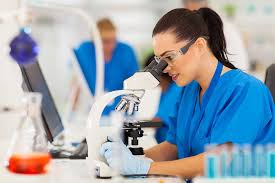
DIPLOMA IN MEDICAL LAB TECHNOLGY (2YEAR)
Diploma in Medical Laboratory Technology (DMLT)
📚 YEAR 1 SYLLABUS – FOUNDATIONAL LEVEL
1. Human Anatomy and Physiology
- Overview of body systems: respiratory, circulatory, nervous, digestive, endocrine, etc.
- Blood composition and circulatory pathways
- Organs and their functions relevant to lab diagnostics
2. Biochemistry – Basic
- Introduction to biochemistry
- Carbohydrates, proteins, lipids – structure and function
- Blood glucose and urea estimation
- Enzymes and electrolytes (Na⁺, K⁺, Cl⁻, HCO₃⁻)
- Normal ranges and clinical significance
3. Hematology – I
- Composition and functions of blood
- Blood collection techniques (venipuncture, capillary)
- Hemoglobin estimation, RBC/WBC count
- ESR, PCV, bleeding time, clotting time
- Blood indices (MCV, MCH, MCHC)
4. Clinical Pathology
- Urine analysis (physical, chemical, microscopic)
- Stool examination
- Semen analysis
- CSF and other body fluids examination
- Collection, preservation, and transport of samples
5. Medical Microbiology – I
- Introduction to microbiology
- Sterilization and disinfection techniques
- Classification of microorganisms
- Collection and transport of microbiological specimens
- Culture media and methods of inoculation
6. Professional Ethics & Lab Safety
- Code of conduct for lab technicians
- Biomedical waste management
- Personal protective equipment (PPE)
- Legal aspects and patient confidentiality
- First aid and fire safety in the lab
📚 YEAR 2 SYLLABUS – ADVANCED LEVEL
1. Biochemistry – Advanced
- Liver and kidney function tests (LFT/KFT)
- Lipid profile
- Serum electrolytes and proteins
- Blood gas analysis
- Use of autoanalyzers and photometry
2. Hematology – II
- Peripheral smear preparation and identification of cells
- Blood grouping and Rh typing
- Coagulation studies
- Bone marrow examination (introductory)
- Hematological disorders and diagnostic markers
3. Immunology and Serology
- Principles of antigen-antibody reactions
- Widal, VDRL, ASO, CRP, and RF tests
- ELISA technique (introductory)
- Rapid tests for infectious diseases (HIV, HBsAg, Dengue)
- Vaccines and immune response
4. Medical Microbiology – II
- Bacteriology: gram-positive and gram-negative organisms
- Parasitology: malaria, amoeba, worms
- Mycology: fungal infections
- Virology: hepatitis, HIV, influenza (introductory)
- Antibiotic sensitivity testing
5. Histopathology and Cytology
- Tissue processing and staining (H&E)
- Fixation techniques
- Cytology smears (Pap smear basics)
- Mounting and labeling of slides
- Tumor and biopsy sample handling
6. Blood Banking and Transfusion Technology
- Blood donation and processing
- Storage and preservation of blood
- Cross-matching and compatibility tests
- Screening for transfusion-transmitted infections
- Role in emergencies and transfusion reactions

